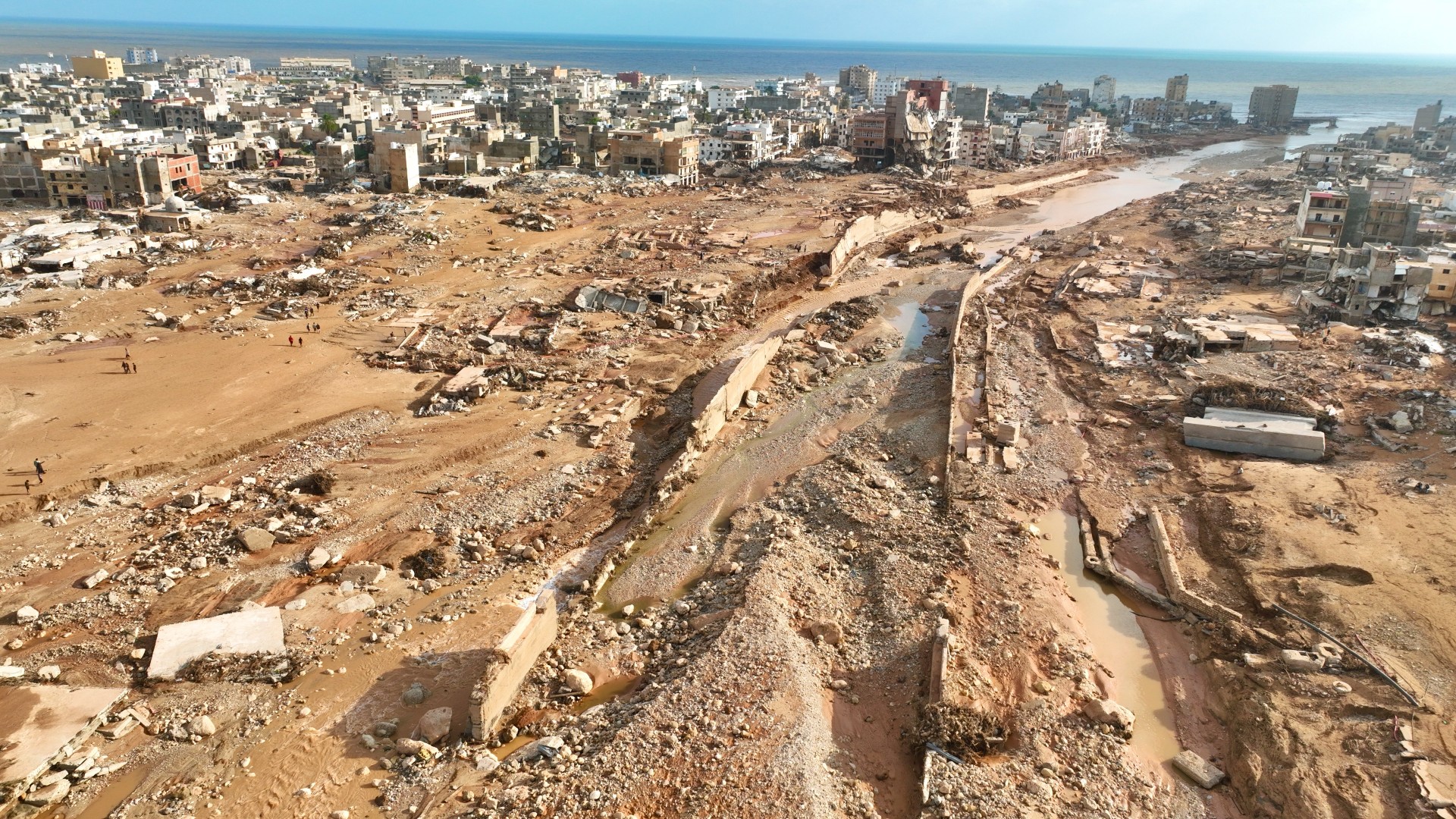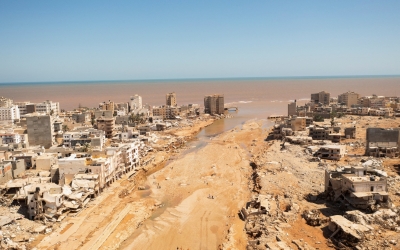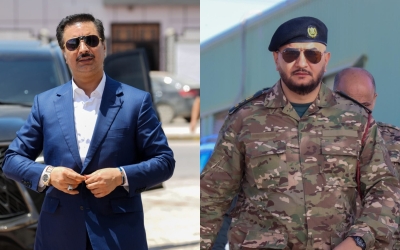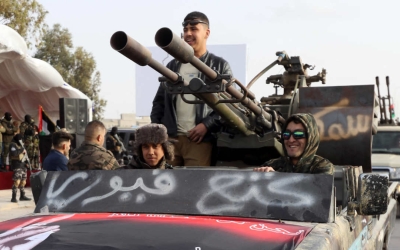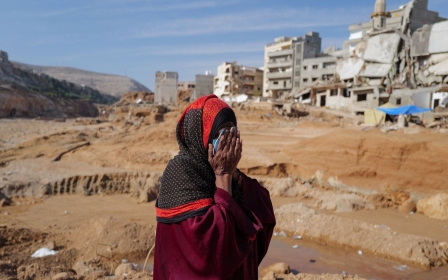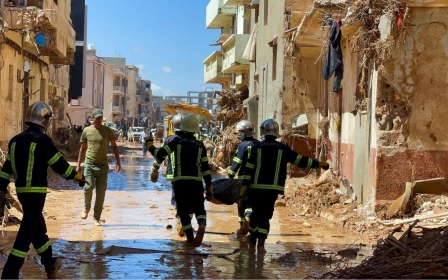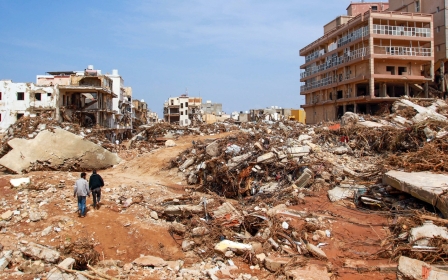In Libya's Derna, Haftar using reconstruction to boost popularity one year after flood
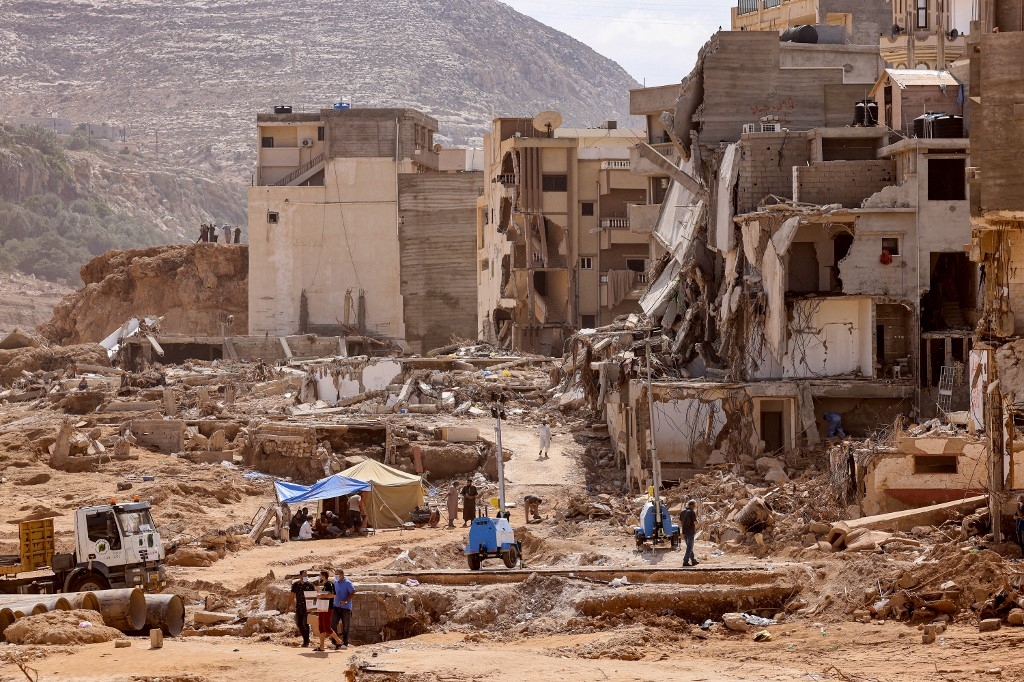
Cranes scattered throughout the city, construction trucks on the move, and the deafening noise of countless machines: one year after the devastating passage of Storm Daniel through the Mediterranean basin, hitting Libya the hardest, the eastern city of Derna has changed a lot.
In recent months, no fewer than 155 building projects have been launched, ranging from the renovation of the university to the construction of new dams, not to mention parks and leisure facilities.
Last February, the government of eastern Libya - a rival authority to the internationally recognised administration based in the western city of Tripoli - created the Libya Development and Reconstruction Fund for this purpose.
The fund is led by 43-year-old engineer Belkacem Haftar, one of the six sons of Khalifa Haftar, the commander who controls the east of Libya. Though it has schemes across Haftar-held territory, Derna appears a priority.
On the night of 10 September 2023, torrential rains from Storm Daniel destroyed the two dams located upstream of the city of 100,000 inhabitants, wedged between Djebel Akhdar (the "green mountain") and the Mediterranean.
New MEE newsletter: Jerusalem Dispatch
Sign up to get the latest insights and analysis on Israel-Palestine, alongside Turkey Unpacked and other MEE newsletters
The unleashed water swept away entire blocks along the Derna River, which cuts the eponymous city in two.
According to the official toll, 4,557 people died, 4,227 disappeared and 7,000 families lost their homes.
The tragedy was ascribed to years of neglect, as the dams had not been properly maintained.
At the end of July, 12 officials responsible for managing water resources and maintaining the dams were sentenced to prison terms ranging from nine to 27 years, charged with crimes including negligence, premeditated murder and wasting public money.
The sentenced officials did not include senior commanders and members of the armed forces, which managed the crisis response.
'People want to enjoy life'
Derna has long been marginalised by the Libyan authorities. A hotbed of protest against the rule of long-time autocrat Muammar Gaddafi, the conservative city became in 2014 the first stronghold of the Islamic State group (IS) in North Africa.
A year later, IS was driven out by a rival group, the Derna Mujahideen Shura Council (DMSC).
From 2018 to 2019, Derna was the scene of a war between this coalition of militias and the forces of Haftar, who conquered the city during a military campaign that saw the commander seize control of all of eastern Libya.
But Derna, with a reputation for hard-line Islamic militancy, was sidelined by the authorities. Its residents, many historically from western Libya, did not benefit from the support of the local tribes that is so important in the east.
In the aftermath of Storm Daniel, the survivors of Derna expressed their anger at what they saw as the authorities' failure to protect them from the floods. According to the UN, most of the deaths could have been prevented if early warning and emergency management systems had been in working order.
Nearly a year later, when Middle East Eye visited the city in the summer, the mood had radically changed.
"The city is modernising," Islam al-Mountasser, a 40-year-old shopkeeper, told MEE with a broad smile.
Mountasser now runs a brand-new perfume shop in front of the park on Garden Street, some 600 metres from the Derna River and the buildings that still lie in ruins.
"After the storm, Derna was a black hole. We spent 100 days without electricity,"’ he recalled.
"I left the city, but the community asked the shopkeepers to come back. When I returned two months later, I was surprised."
The building where his shop was located was reconstructed by Haftar’s fund, while Mountasser redid the interior space himself. He should soon receive 100,000 dinars (around $21,200) in compensation.
'We can see that there are favoured neighbourhoods. Those, like me and my family, who did not welcome the arrival of Haftar's army in Derna are now being punished'
- Derna resident
"The reconstruction's impact on trade has become apparent. Business is better than before," said Mountasser, whose first child was born on the day of the storm.
In the city, where posters glorifying Haftar appear on every street corner, as in all the territories of eastern Libya, criticism is rare and discreet.
Reached by telephone, a resident told MEE on condition of anonymity that there was less renovation work in the historic centre of Derna, where there are families considered sympathetic to the militias that held power previously, and therefore opposed to Haftar.
"We can see that there are favoured neighbourhoods. Those, like me and my family, who did not welcome the arrival of Haftar’s army in Derna, are now being punished," the resident said.
In a report published on Tuesday, Human Rights Watch said the "slow recovery and lack of a national response plan was having a severe effect on the economic rights of survivors".
"In Derna, the hardest hit city, devastation and damage to infrastructure remains widespread, including to homes, water and sanitation networks, electricity grids, hospitals, and schools. Access to financial and government services is limited and thousands of victims remain unidentified or missing," the New York-based organisation said.
Another Derna resident told MEE they were worried about the speed of the work.
"Everything is being built so quickly that I doubt it will be done properly. Today's brand-new infrastructure may not last," the person said anonymously.
But outwardly, there is enthusiasm.
In the newly built park opposite Mountasser’s shop, children could be heard playing loudly, running from a slide to a swing.
Further away, the rebuilt city stadium attracts older youths. Rajab, a 15-year-old boy wearing a FC Barcelona jersey, stopped his football game to speak with MEE.
"We lost our house, we used to live in the city centre," he said.
"We now live with my uncle. But thank God, Derna is fine now. We didn't have a pitch like this one to play before."
A few metres down the street, the Renaissance Cafe, built by Haftar's fund, is at full capacity. Mohamed Nasser, its manager, obtained the job in compensation for the destruction of his refreshment bar by the storm.
The 25-year-old n reckons his income has increased by 60 percent since then.
"People want to enjoy life. They go out more," he told MEE.
On the walls of his cafe are displayed photos of Haftar visiting Derna, the eastern Prime Minister Osama Hammad and, most prominently, Belkacem Haftar.
The latter seems hyperactive, like the fund he runs, which reportedly operates in about 20 Libyan cities and closely oversees Derna's reconstruction.
"We have clear objectives: companies are working day and night, because Derna must be rebuilt - better than before the storm - by the end of 2025," Belkacem Haftar told MEE.
Several companies have reportedly already been dismissed for being late, a fund employee told Middle East Eye.
As for the dams, the priority will be to ensure more serious maintenance in the future, a local official told MEE.
The fund is currently studying four different proposals. One suggests not rebuilding the dams at all, arguing that the river has been so widened by the storm that there is no longer much risk of flooding.
Politicised reconstruction work
The fund's operating mode and largesse appear to have earned Haftar some degree of popular support from local Libyans, accustomed to the authorities’ inertia. Or at least, this seems one of the goals.
According to Jalel Harchaoui, an associate researcher at the British Royal United Services Institute (RUSI), "there is a real desire on the part of the reconstruction fund to stand out.
"They want to get the message across: we make promises and we keep them," the Libya specialist told MEE.
The fund is also relaunching projects that have been at a standstill for years. In 2005-2008, after the removal of international sanctions imposed on Gaddafi’s Libya in the 90s, coinciding with a global rise in oil prices, Libya experienced an exceptionally prosperous period.
The Gaddafi government then launched projects worth tens of billions of dollars, under the supervision of the Organisation for the Development of Administrative Centres (ODAC), then headed by Ali Dbeibah, cousin and brother-in-law of the current prime minister of Libya's western government, Abdul Hamid Dbeibah. But the work was often stalled.
'There is a real desire on the part of the reconstruction fund to stand out. They want to get the message across: we make promises and we keep them'
- Jalel Harchaoui, Royal United Services Institute
"Everything was so abnormally slow that many projects were bogged down or at a standstill before the revolution of February 2011 [that overthrew Gaddafi]," Harchaoui explained.
In January of that year, sit-ins took place on construction sites that were no longer making any progress, he added.
"The prices of these projects, at the time, were rather realistic, but they were rarely finished because 30 percent, sometimes more, of the budget often disappeared in bribes," he added.
This is the case of an entire neighbourhood at the western entrance to Derna. The project to build 2,000 apartments by Chinese and Korean companies took the form of concrete skeletons abandoned since 2009.
The construction site restarted a few months ago, with mainly Egyptian and Libyan companies involved.
The fully furnished and equipped 200-square-metre apartments are set to be offered for free in December to some of the 7,000 Dernawi families who lost their homes during the storm. So far, none has been rehoused.
According to observers, the political dimension of these construction efforts is evident, and it is a policy that was successfully implemented in the past.
"This is the strategy of King Idris," a local journalist who wished to remain anonymous told MEE, in reference to the emir who reigned over Libya from 1951 until the coup led by Gaddafi in 1969.
"Idris ruled over [the eastern region of] Cyrenaica and, thanks to the discovery of oil in the territory in 1959, he developed the region and thus drew [the north-western region of] Tripolitania under his influence to unify the country and abolish federalism in 1963," he explained.
Similarly, Khalifa Haftar is believed to nourish the ambition of controlling the whole country and could use reconstruction as a means to extend his influence to the west.
Libya broke down into warring factions after the overthrow and death of Gaddafi in 2011. Fighting in the strategic, energy-rich country rapidly degenerated into a proxy war with foreign powers backing opposing sides.
In 2019, Haftar tried to conquer the capital Tripoli but was defeated by the forces of the UN-recognised government with the help of Turkey. A ceasefire was concluded in 2020 and a period of relative calm followed, despite unsuccessful attempts to reunify the country.
The sinews of war
Last month, Haftar deployed his troops in the southern and western regions of the country, close to the Tunisia-Algeria border, sparking alarm in the international community about the possibility of a resumption of fighting in the country and beyond.
Now, if the eastern leader decides to heed the calls for "wisdom and restraint" and opt instead for a continuation of his "diplomacy of concrete", money will be needed.
While money is not lacking in Libya, the financing of the reconstruction fund remains opaque, as does the cost of the work. Belkasem Haftar claims to benefit from the part of the national budget dedicated to development. But the long-time governor of the central bank, Sadik al-Kabir, has officially denied any payment.
However, the tensions that arose nearly a year ago between Dbeibah, the western prime minister, and Kabir following disagreements over economic policy are said to have pushed the latter closer to the eastern camp.
According to analysts, arrangements were found between the central bank and the eastern administration so that the east's banks, to which Haftar's government was indebted, would receive assets allowing them to extend credit to the authorities.
However, since August, the central bank has been shaken by a deep crisis after it was besieged by fighters who reportedly tried to force Kabir to resign.
On 18 August, Libya’s presidential council, which is aligned with Dbeibah, unilaterally announced the dismissal of Kabir, who fled the country.
In response, Libya's eastern government suspended all oil production and exports.
The crisis of the central bank, the sole legal repository for Libyan oil revenue, which pays state salaries across the country and supports projects nationwide, could jeopardise the funding of Haftar’s financial arm and his goals of cementing power.
Middle East Eye delivers independent and unrivalled coverage and analysis of the Middle East, North Africa and beyond. To learn more about republishing this content and the associated fees, please fill out this form. More about MEE can be found here.


